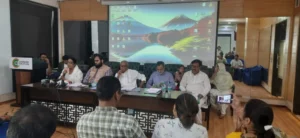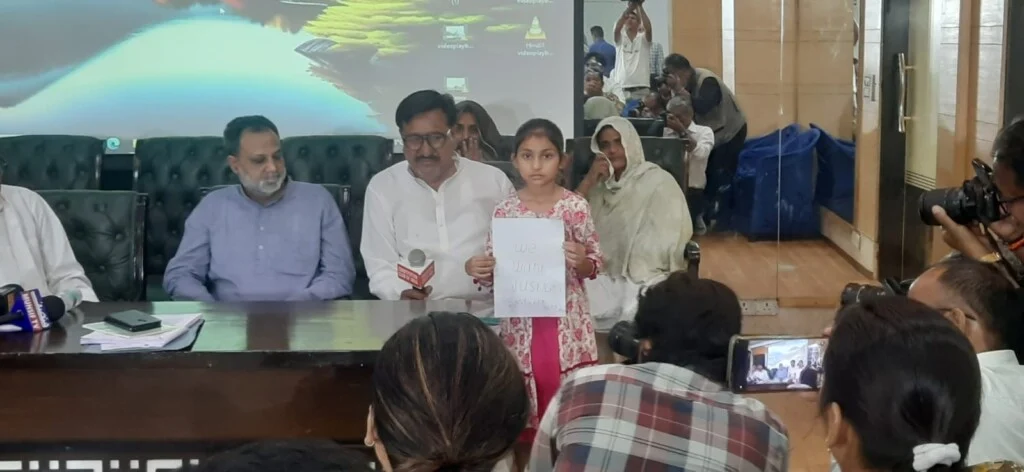 Amid the bustling streets of the capital, an 8-year-old girl’s voice pierced through the air, filled with pain, innocence, and a desperate longing for justice.
Amid the bustling streets of the capital, an 8-year-old girl’s voice pierced through the air, filled with pain, innocence, and a desperate longing for justice.
Clutching a placard reading, “We want justice,” Maida, the young daughter of slain Amjad Khan, pleaded with Prime Minister Narendra Modi to arrest her father’s killers. Her heartfelt words, “Modi uncle, hum bhiaapkeparivar ka hissahain, mere papa keqatilon ko giraftarkaro” (Modi uncle, we are also part of your family, arrest my father’s killers), echoed in the halls of the Constitution Club in Delhi, where the victims’ families had gathered, hoping for answers and accountability.
For Maida, her two-year-old sister, their handicapped mother, and the brutal murder of their father have shattered their world, leaving them struggling to survive amid the grief of losing a beloved family member.
The tragic event took place on September 23 in Maksi, Shajapur district, Madhya Pradesh, where Amjad Khan, a 40-year-old father, was shot dead and his brother-in-law, Junaid, critically injured during a violent altercation involving a BJP membership drive.
The incident left Maida and her sister orphaned, their mother disabled, and the community in turmoil. The attackers, allegedly BJP members, had pressured local Muslims to join the party, leading to a deadly clash that now haunts the streets of Maksi.
Maida’s impassioned plea for justice is not just the voice of one child, but the cry of an entire community that has been victimised and silenced. Her words represent a larger story of rising communal violence in India, where families like hers are left without protection or recourse as political forces stoke division and hatred.
The journey to Delhi, organised by Congress leader and former Madhya Pradesh Chief Minister Digvijaya Singh, was a last-ditch effort to bring attention to the suffering of the victims and demand accountability from the authorities.
Maida’s face, a poignant image of innocence lost, has become a symbol of the pain endured by so many across the country who held a placard saying, “We want justice.”
Singh, who brought the victims’ families to Delhi, raised alarm over the escalating communal violence in Madhya Pradesh, accusing the BJP-led state government of playing a partisan role in stoking tensions.
The former Chief Minister highlighted two recent incidents of communal unrest, one of which led to Amjad Khan’s death, and called for intervention from the Prime Minister and Union Home Minister Amit Shah.
“There has been a marked increase in communal violence since 2014,” Singh said, his voice heavy with frustration.
“Since 2014, the ‘double-engine’ (BJP-ruled) states have filed false cases against innocents while letting criminals go scot-free. They have a narrow vision in which just one community is punished and harassed,” Singh said at a presser alongside rights activists and victims of the violence in Ratlam and Maksi towns of Madhya Pradesh.
“The BJP government’s actions – or lack thereof – are deepening divisions in society and undermining the integrity of the administration. Instead of working to unite the country, they are fuelling hatred and violence,”Singh added.
The first incident occurred on September 7 in Ratlam, when a Ganesh Chaturthi procession was taken along an unauthorised path, passing in front of a mosque.
Tensions quickly escalated, and false rumours were spread, claiming that stones had been thrown at the procession and that the Ganesh idol had been broken. These allegations were later proven false when the local police,who reviewed CCTV footage, find no evidence of any attack by Muslims.
Speaking to Radiance, Mohammad Asif Meo (Engineer), president of Muslim SamajRatlam, said during the Ganesh Chaturthi procession, a rumour was spread that people of a particular community had pelted stones on the procession. Even such a big lie was spread that the idol of Ganesh was broken. “All these rumours were proved wrong when the police officer of the district, SP Rahul Lodha, examined all CCTV footage; he did not see any Muslim pelting stones on the procession, nor did anyone break the Ganesh idol,” he said.
The police registered an FIR against more than 10 named and about 250 unknown people. The name of the District Vice President of BJP YuvaMorcha is also included among the named accused, which cannot be a mere coincidence, but seems to be an experiment. Due to the wisdom of a senior IPS officer in Ratlam, communal violence did not erupt and he succeeded in maintaining peace and harmony. Instead of appreciating the police action, the BJP state government transferred the SP, Rahul Lodha immediately, Asif said.
The fact that the District Vice President of the BJP YuvaMorcha was named as an accused in the FIR raised further concerns about the party’s role in fostering division.
The situation worsened in Maksi, where the BJP’s membership drive led to more violence. According to local reports, BJP leader Sameer pressured local Muslims, including Anees, to join the party.
When Anees refused, violence erupted. The next day, members of the Muslim community submitted a written complaint to the SP, Shajapur. This angered BJP leaders, who allegedly organised an armed attack on the complainants. The attackers, reportedly acting in the presence of police, opened fire with the palpable intent to kill. The victims included Amjad, Iqbal, Junaid, Abrar, Abuzar, Rizwan, and Javed.
Despite filing a complaint with the police, Anees was arrested, and no action was taken against the perpetrators. The situation escalated when, on September 23, a group of BJP supporters, allegedly led by former BJP Municipal President Mahendra Patel, entered the Muslim neighbourhood, opening fire on residents.
Amjad Khan was killed in the attack, and several others, including Junaid, were critically injured. Junaid, who remains in a coma, is still fighting for his life. Local activists and community members have accused the police of being complicit in the violence, alleged that they shielded the attackers and failed to protect the victims.
The police are allegedly planning a cross-case against the victims to cover up their failures. The accused include Kalu Patel, Arun Patel, Sumit Patel, Mahendra Patel, Rahul Jain, Bittu Jain, Arjun Patel, Kuldeep Khati, Zoyab, and Sameer.
JavedDipty, a High Court advocate who accompanied the victims’ families, told Radiance, “Despite the victims’ complaints, no action was taken. The police failed to act when they should have, and now a man is dead, and others are fighting for their lives.”
The inaction of the police in Maksi has led to widespread condemnation. According to Dipty, the police’s refusal to intervene earlier allowed the situation to spiral out of control.
“If the police had arrested the attackers, as they did with Anees, the violence could have been prevented. But instead, the police stood by as the attackers opened fire on innocent people,” he said.
The tragic outcome of the attack on September 23 has left Amjad Khan’s family devastated. Maida’s mother, who is handicapped, is now left to care for her daughters, while Junaid’s family watches helplessly as he clings to life in the hospital.
Despite their suffering, the family has not received any financial assistance from the state government, and no investigation has been launched into the incident.
Singh, in his letter to Prime Minister Modi and Home Minister Shah, called for a fair and impartial investigation into the violence, the arrest of the perpetrators, and compensation for the victims.
“The administration and the police are equally responsible for what happened in Maksi,” Singh said. “This is a failure of governance, and it’s time for the central government to take action.”
The call for justice is not just for Amjad Khan but for all the victims who have been affected by the rise in communal violence across India. The victims’ families, particularly Maida, have been left with nothing but memories of their loved ones and a burning desire for accountability.
Whether they will ever receive the justice they seek remains uncertain, but one thing is clear: the fight for justice is far from over. The families have vowed to continue their struggle, even if it means taking direct action.
As Singh put it, “If the government continues to ignore the plight of the victims, we will take matters into our own hands. We will march for justice, and we will not rest until those responsible for these atrocities are held accountable.”
The story of Maida, her family, and the victims of the violence in Maksi is a reminder of the human cost of communal tensions in India. It’s a call for justice, for accountability, and for a government that is willing to protect all its citizens, regardless of their faith or community.
Until that happens, the families of the victims will continue to knock on doors, hoping for the justice they deserve.
Singh told Radiance that he would raise the matter in the forthcoming winter session of Parliament.
The happenings in the country can be aptly described with this couplet:
They are the murderers too, they are the prosecutors too, Whom then will my kin prosecute for my murder? (Wahiqaatil, wahimukhbir, wahimunsifthehrey/Aqrbamerey Karen khoon ka dawakis par?)


